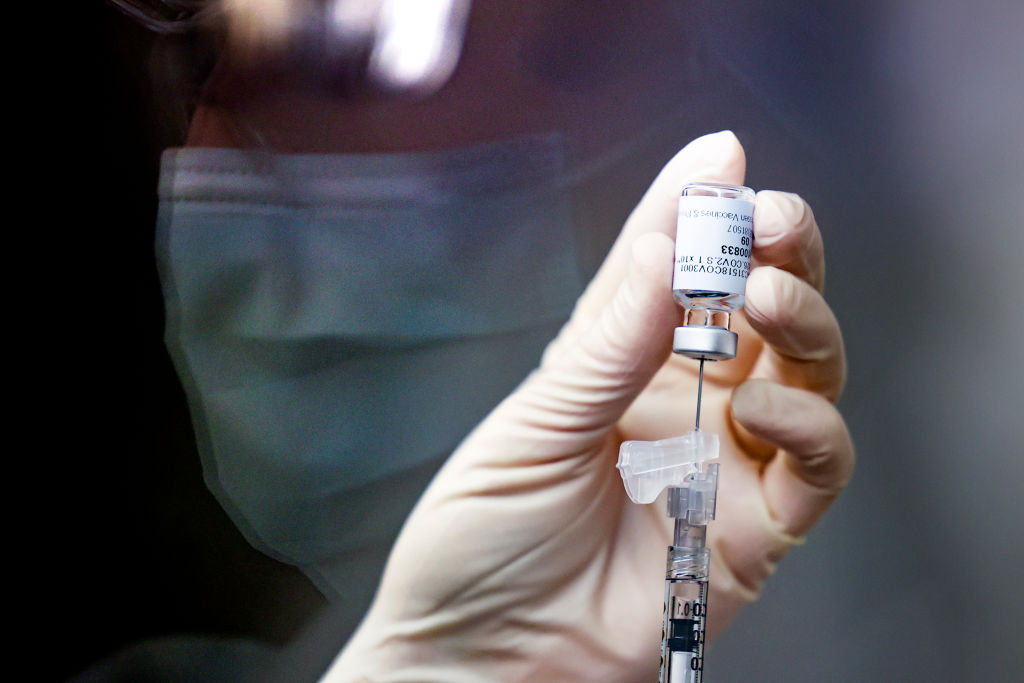FDA adds new warning of rare nerve syndrome to Johnson & Johnson COVID-19 vaccine


A free daily email with the biggest news stories of the day – and the best features from TheWeek.com
You are now subscribed
Your newsletter sign-up was successful
The Food and Drug Administration on Monday updated its fact sheet for the Johnson & Johnson COVID-19 vaccine, saying that while the chance of developing Guillain-Barré syndrome is "very low" after receiving the shot, there is an increased risk.
Preliminary reports show that there have been about 100 suspected Guillain-Barré syndrome cases among people who received the one-dose Johnson & Johnson vaccine; the vaccine has been administered to more than 12.8 million Americans, the Centers for Disease Control and Prevention says. Among the people who developed the syndrome, the symptoms developed about 42 days after vaccination.
Guillain-Barré syndrome is a rare condition where the immune system attacks the nerves, and typically comes on after a person is infected with a virus. Every year, 3,000 to 6,000 Americans develop the illness, with most fully recovering. An FDA official told Axios that while the "available evidence suggests an association" between the Johnson & Johnson vaccine and increased risk of Guillain-Barré syndrome, "it is insufficient to establish a causal relationship."
The Week
Escape your echo chamber. Get the facts behind the news, plus analysis from multiple perspectives.

Sign up for The Week's Free Newsletters
From our morning news briefing to a weekly Good News Newsletter, get the best of The Week delivered directly to your inbox.
From our morning news briefing to a weekly Good News Newsletter, get the best of The Week delivered directly to your inbox.
The FDA said there is no link between Guillain-Barré syndrome and the COVID-19 vaccines made by Pfizer and Moderna. Public health officials stress that the benefits of the vaccine vastly outweigh the risks, with the CDC saying on Monday that in the United States, "nearly all COVID-19 hospitalizations and deaths are now occurring in unvaccinated people. The risk of severe adverse events after COVID-19 vaccination remains rare."
A free daily email with the biggest news stories of the day – and the best features from TheWeek.com
Catherine Garcia has worked as a senior writer at The Week since 2014. Her writing and reporting have appeared in Entertainment Weekly, The New York Times, Wirecutter, NBC News and "The Book of Jezebel," among others. She's a graduate of the University of Redlands and the Columbia University Graduate School of Journalism.
-
 What is the endgame in the DHS shutdown?
What is the endgame in the DHS shutdown?Today’s Big Question Democrats want to rein in ICE’s immigration crackdown
-
 ‘Poor time management isn’t just an inconvenience’
‘Poor time management isn’t just an inconvenience’Instant Opinion Opinion, comment and editorials of the day
-
 Bad Bunny’s Super Bowl: A win for unity
Bad Bunny’s Super Bowl: A win for unityFeature The global superstar's halftime show was a celebration for everyone to enjoy
-
 A Nipah virus outbreak in India has brought back Covid-era surveillance
A Nipah virus outbreak in India has brought back Covid-era surveillanceUnder the radar The disease can spread through animals and humans
-
 Trump HHS slashes advised child vaccinations
Trump HHS slashes advised child vaccinationsSpeed Read In a widely condemned move, the CDC will now recommend that children get vaccinated against 11 communicable diseases, not 17
-
 A fentanyl vaccine may be on the horizon
A fentanyl vaccine may be on the horizonUnder the radar Taking a serious jab at the opioid epidemic
-
 Health: Will Kennedy dismantle U.S. immunization policy?
Health: Will Kennedy dismantle U.S. immunization policy?Feature ‘America’s vaccine playbook is being rewritten by people who don’t believe in them’
-
 How dangerous is the ‘K’ strain super-flu?
How dangerous is the ‘K’ strain super-flu?The Explainer Surge in cases of new variant H3N2 flu in UK and around the world
-
 Vaccine critic quietly named CDC’s No. 2 official
Vaccine critic quietly named CDC’s No. 2 officialSpeed Read Dr. Ralph Abraham joins another prominent vaccine critic, HHS Secretary Robert F. Kennedy Jr.
-
 This flu season could be worse than usual
This flu season could be worse than usualIn the spotlight A new subvariant is infecting several countries
-
 Covid-19 mRNA vaccines could help fight cancer
Covid-19 mRNA vaccines could help fight cancerUnder the radar They boost the immune system
